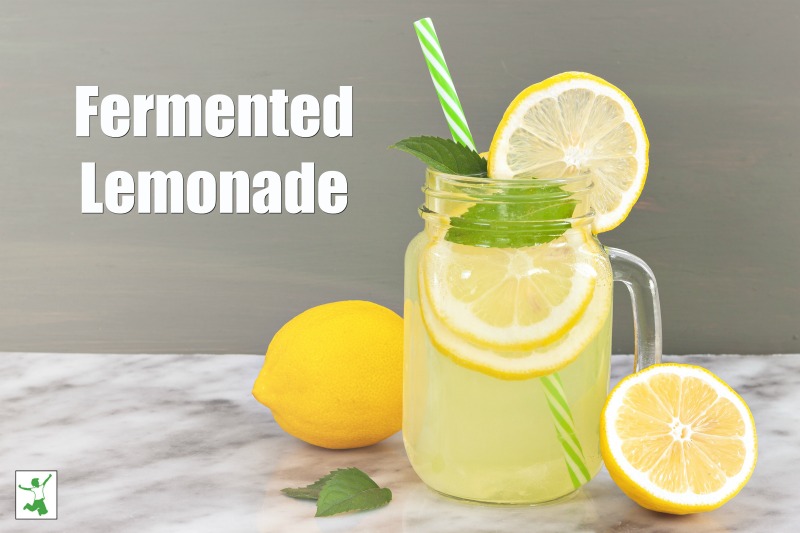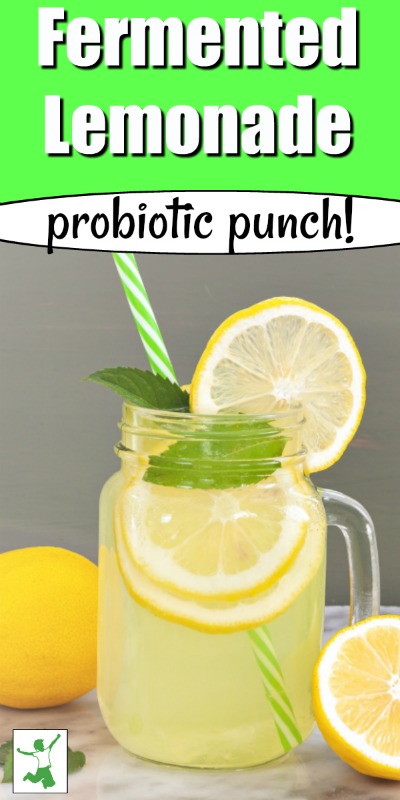Table of Contents[Hide][Show]
Easy recipe for Hindu fermented lemonade, a lightly cultured traditional beverage to add probiotics and enzymes to any meal.

For those of you who are wanting to take the leap and start adding a daily probiotic element to your whole foods diet, this recipe for fermented lemonade, also called Hindu lemonade, is an all-time favorite of traditional foodies.
It is as easy as it is delicious, pleasing both child and parent alike.
This type of healthy beverage is also the answer to those sugar-laden, juice boxes that most kids have packed in their school lunches every day. Worse, that sugar is frequently a juice blend with added GMO high fructose corn syrup.
Even a 100% juice box is still just sugar in the final analysis. Once you pasteurize fresh juice, the nutrition is long gone and all that remains is obesity-promoting fructose and a sugar spike/crash for the child. Not the best choice for school lunch by any means!
How to Make Hindu Lemonade
Packing this homemade fermented lemonade, on the other hand, is a nice treat that will delight, nourish, and strengthen your child’s immune system.
Fresh whole milk a great choice for a school lunch (when the kids were young, I usually packed a thermos of cold, fresh milk … sometimes I packed sipping bone broth too), but when you have run out temporarily or just want to pack a juice treat, this is a great choice.
Note that using freshly squeezed lemon juice produces the most reliable results. Using pasteurized store juice does work, but you run the risk of mold.
Why is this? Store lemon juice is pasteurized, which eliminates the natural probiotics and enzymes that faciliate the fermentation to “take” properly.

Fermented Lemonade Recipe
Easy recipe for fermented lemonade that will no doubt be one of your family’s favorites as it is rich in flavor and probiotics.
Ingredients
- 6-8 medium lemons or 1- 1.5 cups of lemon juice (preferably fresh squeezed)
- 1/2 cup sucanat
- 1/2 tsp ground nutmeg preferably organic
- 2 quarts filtered water
- 1/2 cup liquid whey
- vegetable starter optional. Use if you prefer dairy free starter.
Instructions
-
Mix all ingredients together in a 1 gallon glass jug.
-
Cover and leave on the counter for 2 days and then transfer to the refrigerator.
-
The lemonade flavor improves over time, but is drinkable immediately after the 2 day fermentation period.
-
If it is too tart compared with the overly sweet lemonades from the store, mix 1 or 2 drops plain liquid stevia to each glass until your family adjusts to the mildly sweet/sour flavor.
Recipe Video
Recipe Notes
Limes or a combination of lemons and limes may be substituted for the lemons. The juice must be freshly squeezed.

Reference
More Information
Switchel: Nature’s Healthy Gatorade
How to Make Orangina (Fermented Orange Juice)
How to Make Ginger Ale
Brew Your Own Healthy and Traditional Root Beer








Sarah – I can't wait to try this. My 11-year-old son LOVES lemonade (really, the more sour, the better). Two questions – 1. when leaving out on the counter, is that with the top open, or covered (with a cloth or lid)? 2. Somewhat unrelated, but how do you know when whey is no longer useable? I clabbered about 1.5 cups of raw milk and strained off the whey about 2 months ago, and have only used about 1/2 of what I got (which was a surprisingly huge amount). There are little white flecks all throughout what I have left, and I'm not sure if it's okay to use or if it's time to make more. Thanks!
If we are using fresh frozen lemon or lime juice, how much should we use? I have lemon juice frozen in 1/2 c. baggies from the tree, so I am really excited to find another use for them!
Hi Sarah,
I just love your emails I get. I was wondering if I can freeze this lemonade for a frozen treat? Will it harm the probotic enzymes?
thanks,
Nance
Sarah- with COVID 19, heading to grocery store less and a friend recommended True Lemon as a handy lemon substitute for daily detox w/water. Will you please comment on this lemon substitute which is a crystallized lemon powder and it’s nutritional value? Do you recommend? If so, what substitute ratio? I’m excited to try! Thank you!
I would never use True Lemon. Here are the ingredients per the website: Crystallized Lemon [citric acid, lemon oil, lemon juice]. Non-GMO.
I don’t use anything with citric acid in it! https://www.thehealthyhomeeconomist.com/citric-acid-ingredient/
True Lemon would certainly NOT be appropriate for this recipe.
Hi Sarah,
This looks amazing and I can't wait to try it! I find it so funny that I read through Nourishing Traditions all the time, but I've never noticed this recipe before, same with some others you've videoblogged – must be some kind of comfort-level goggles I'm reading through!! Thanks for your awesome videos 🙂
Shannon
Oops, I meant Janet, not anonymous – didn't see that you signed your comment at the end!
Hi Anon, fresh frozen juice would be fine. A tiny amount of nutrition is lost this way but no enzymes are lost so the fermentation should work beautifully.
Hi Sarah, I get all your up dates and really enjoy your videos. I have been doing most of what you teach since 2004 but always learn something new every time I watch one of your videos. My question is about the lemon & lime juice. May I use fresh frozen juice? When I'm given extra lemons & limes I save some of them to use fresh and juice & freeze the rest. Thanks again for all you do to enlighten us. Janet
Excellent! I used to make sekanjabin- a medieval middle eastern drink made with mint. It's very similar- make a simple syrup with water and sugar (or honey), add a handful of mint leaves and allow to steep for several minutes. Add red wine vinegar, steep for a few more minutes. Strain. It's shelf stable for years, and you can add a tablespoon or two to a glass of water for a light drink.
I haven't made it in quite a while because of the sugar content, but fermenting it would certainly take care of that! I'd heard of the lemonade version too, but never made it, so I'm very glad to learn how it's made! 🙂
No, it tastes like fermented lemonade. There is no cheesy taste. You do not need to ferment any longer with honey. Yes, whey off yogurt works fine. I actually made a batch a few days ago and I was completely out of liquid whey and I used 2 BioKult probiotic capsules instead (I emptied them into the liquid and mixed in with the sucanat. It turned out fantastic and tasted just the same just a little less sour.
Wow Sarah – I wonder if I could use that as a culture for homemade yogurt? What an awesome idea. I’m mixing the fermented lemonade right now using whey I got from yogurt. Thanks so much for all you’re doing!
I’ve been drinking raw milk for a week along with fermented cod liver/butter oil and cultured, grassfed butter and I’ve lost five pounds! Unbeleivable how much it affects my appetite – I’m never hungry!
Does it taste weird? I have been hesitant to do any fruit/vegetable ferments with whey because I have heard some talk about a "cheesy" taste to the finished product. Also, I assume that the whey I'd strain off raw milk yogurt would work just fine? I'm considering this because my daughter LOVES lemonade and it's been a rare treat (though I usually make it with honey and fresh lemon juice). Also, if you use honey, do you need to let it ferment longer (sucanat gives me a headache)? Thanks!